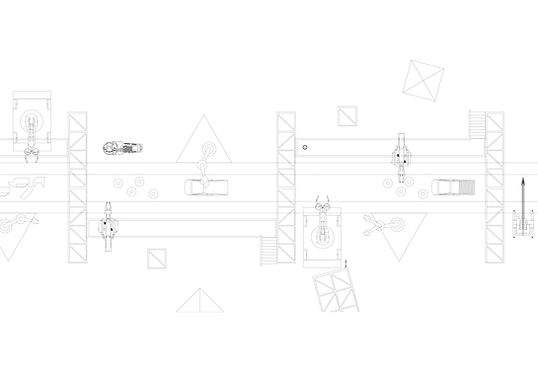TESLA RECYCLING FACTORY
.jpeg)

Project: Conversion of the Tesla Gigafactory Berlin-Brandenburg into a Tesla Recycling Factory Year: 2025, Type: Exhibition of the Romanian Academy Rome Architecture: Opposite Office Team: Johanna Heim, Elizabed Bakandize, Benedikt Hartl Location: Rome, IT
Following a dramatic collapse of Tesla’s reputation, driven largely by Elon Musk’s conspiratorial drift and erratic political positioning, Tesla sales in Germany have plummeted by over 70%. With public trust severely damaged and no signs of recovery in sight, production has been halted. The Berlin-Brandenburg Gigafactory—once a flagship of innovation—is now obsolete. At the same time, thousands of Tesla owners are seeking to return their vehicles, no longer willing to associate with a brand that symbolizes wealth extraction, social inequality, ultra-rightwing, exclusion, hard-heartedness and dystopian techno-utopianism. This context demands not just a symbolic response, but a systemic one. In a radical gesture of spatial and ethical transformation, the Gigafactory is now being repurposed into a Tesla Recycling Facility—a place where vehicles are not produced, but unbuilt. Each Cybertruck is meticulously deconstructed down to its raw materials. This is not destruction per se, but reparation: a true closing of the loop, a pioneering act in circular economy and regenerative industry. At the heart of this transformation lies a turning point: Elon Musk, confronted by public backlash and the worsening global economic crisis, begins to question the core tenets of his ideology. No longer satisfied with profit maximization and policy-making for the ultra-rich, he experiences an unexpected shift in perspective. In a surprising act of humility, he commissions Opposite Office to redesign the Gigafactory into a space for social utility.
Instead of producing status symbols, the factory now creates instruments of solidarity. From the raw body panels, windows, and wheels of decommissioned Cybertrucks, Opposite Office designs:
- Mobile soup kitchens for urban neighborhoods,
- Public gathering modules for social interaction in isolated communities,
- Emergency sleeping pods for unhoused populations, Mobile libraries and learning hubs for underfunded regions,
- Solar-powered health stations, Floating public toilets and wash units for refugee camps and disaster zones
These recycled vehicles become artifacts of a broader cultural and civic transformation: from individual power to public service, from private ownership to collective resilience.
The Tesla Recycling Factory is no longer just a design project—it becomes a platform for public reflection and hands-on engagement. In its exhibition form, the project is presented as an interactive model that allows visitors to activate the dismantling process themselves. With the push of a button, participants can trigger a mechanized hammer to come crashing down on a miniature Cybertruck—symbolically enacting the shift from technological idolization to critical reuse.



